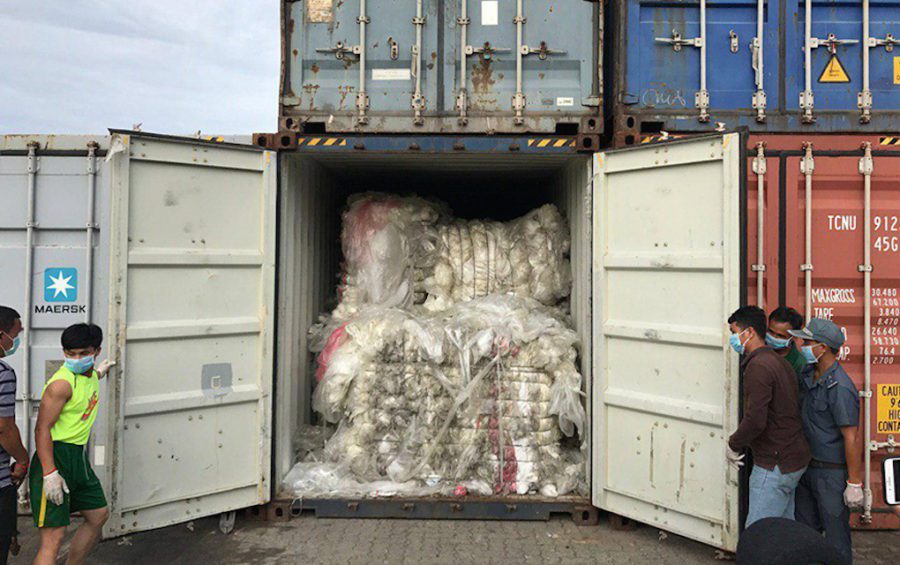A local company that imported about 1,600 tons of plastic waste since last year was fined nearly $255,000 and ordered to send the trash back to the alleged source countries, the U.S. and Canada, by August 24, officials said on Tuesday.
Authorities earlier this month opened 83 plastic-packed shipping containers, which arrived at the Sihanoukville Autonomous Port between September 2018 and January, in the presence of journalists and photographers. They said 70 containers came from the U.S. and 13 from Canada.
Neither country has publicly confirmed whether the containers originated from their shores.
The revelation from the Cambodian government came amid growing public criticism among Southeast Asian governments over imports of trash from industrialized countries, including the U.S., Canada and Australia.
The company, Chungyuen Plastic Manufacture, was fined under Cambodia’s customs, environmental protection and solid waste management regulations, according to a joint statement from the Environment Ministry and the Finance Ministry’s customs and excise department issued on Tuesday.
The containers in question had passed through ports in Singapore, Malaysia and Vietnam before arriving in Cambodia, the statement said.
If Chungyuen failed to pay the fine and send the containers back to their countries of origin by the deadline next month, the customs department would take legal measures, it said.
Kun Nhim, the department’s director, told reporters on Tuesday that the company’s owner, Suon Lok, was Cambodian, and that “no Chinese were working at that company.”
Nhim had said earlier this month that a preliminary investigation showed the company had ties to Chinese nationals.
Lok, who is listed as the company’s chairman of the board of directors on the Commerce Ministry’s online business registry, did not immediately respond to emailed questions.
Nhim said the discarded plastic was not hazardous to human health or the environment.
Asked why Cambodia didn’t recycle the plastic, Environment Ministry spokesman Neth Pheaktra said the government did not allow companies to import waste from overseas for recycling, but encouraged others to recycle existing plastic in the country.
“We encourage recycling of plastic waste in our country because Cambodia is also facing a problem of plastic,” Pheaktra said on Tuesday.
“The use of plastic has increased so the Ministry of Environment tries to help people change their behavior of using plastic to pack food and turn to use [reusable] baskets to reduce the environmental impact,” he said.
Asked on Wednesday whether the U.S. and Canada, or the exporting companies, had agreed to take back their plastic waste, Pheaktra told VOD that officials were “working on this process.”
“Maybe you can ask them,” he added.
The U.S. Embassy in Phnom Penh declined to comment and Canada’s environment department did not immediately reply to emailed questions from VOD.
Earlier this month, U.S. Embassy spokeswoman Emily Zeeberg said that the U.S. was offering Cambodia help to “determine both the exporter (country of origin) and the importing entity here in Cambodia,” without confirming whether the waste was exported from the U.S.
Jenn Gearey, spokesperson for Environment and Climate Change Canada, had told VOD that the Canadian Embassy in Phnom Penh had requested more information from Cambodian officials about the waste.
Canada was “taking action to reduce plastic waste and support the development of innovative solutions, including spending $100 million to help developing countries prevent and manage plastic pollution,” Gearey said.
Additional reporting by Matt Surrusco and Ouch Sony
(Translated and edited from the original articles on VOD Khmer)













